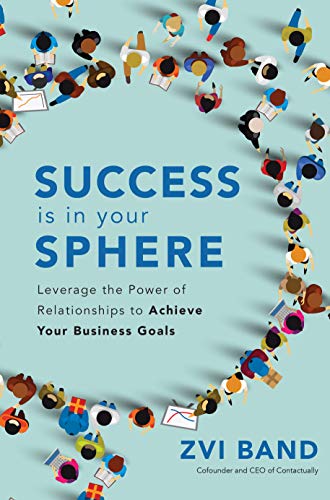I agree with Zvi Band the author of the book Success is in your Sphere that “relationships are our most important asset”. From everything I’ve seen, if you want to outperform in sales in the long run, you need to build your own network of people that know, like and trust you. No amount of technology or great messaging will get you even close to the salesperson with a top-notch Rolodex.
Success is in your Sphere shows you how to build a world-class network and maintain it. The book presents a framework for building relationships called “CAPITAL”. Here’s how the framework breaks down.
1. Consistent Execution
Consistent execution over the long haul is key to building relationships. You can’t expect instant results. Relationships build over a long period of time as trust grows between the parties. Zvi points out that consistent execution is actually where we are most likely to mess up. We need to execute on the CAPITAL approach every day. We need to make it a habit. If you want a method for developing new habits, I recommend reading the book The One Thing and learning about the “66-day challenge.”
2. Aggregate
The first actionable step in the CAPITAL process is aggregating a list of all the people you know. The idea is to pull together your various contact lists so you can consider merging the appropriate ones into one master database of all your contacts. Given the volume of information involved here, you may need some tools, or people, to help you process all these names and their associated data (such as email addresses, phone numbers etc.)
3. Prioritize
Next you need to give a priority rating to each of your contacts in this list. Give this priority rating in the context of your goals. What is it that you are actually trying to achieve? I’ll refer you to the book The One Thing again if you need help defining your goals. Use and “80/20 rule” when assigning priority to your contacts. As with so many things, 20% of the people in your list may bring you 80% of the value. Think about assigning this 20% your top priority.
4. Investigate
You need to understand people to connect with them. This means you have to do some research on people before calls and meetings. You need to keep good notes in meetings to remember the “small stuff” (like their kids’ names and ages, their interests, where they went on vacation–i.e. the stuff that really matters to real people!) If you want to see how far you can take this, check out Harvey Mackay’s Mackay 66.
5. Timely engagement
If you want a relationship to evolve, you’ll need to regularly be in touch with that person. Send them something relevant based upon something that happened in their life or yours. If you don’t have something relevant to talk about, then even “just thinking of you” is better than no communication at all. As Keith Ferrazzi says in his classic networking book Never Eat Alone, “relationships are more like muscles—the more you work them, the stronger they become”. Don’t let so much time slip by between each communication that you become irrelevant to your important contacts.
6. Add value
Whenever you can, try to add value to your connections. The two big categories here are content and connections. What information can you share with your contact that might help them meet their goals (business or personal)? Who can you connect them to that may help? When communicating consider “changing the channel” to stand out a little. Send old-fashioned paper birthday cards to important contacts vs. posting on their Facebook page with everyone else.
7. Leverage
None of this relationship-building framework is “rocket science” but it’s not that easy to keep it up. Zvi suggests making the process easier by removing “friction”. Examples of “removing friction” include:
- Finding something like a simple CRM to organize your contact information and follow up dates, notes etc.
- Developing email/text templates that you can customize each time you need to send a message.
- Keeping note cards handy (even with your return address already on them) to make sending cards easier.
- Developing a list of books that you like that you commonly recommend or gift.
